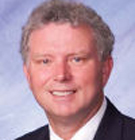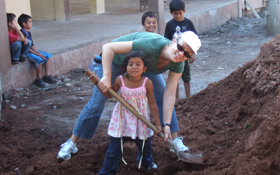Make a Difference
The earthquake in Haiti was the greatest natural disaster of recent history in the Western Hemisphere. The loss of lives and the damage to homes, roads, businesses and schools were massive. Nonprofit and government organizations from around the world are grappling to respond. While it is easy to sit back and let others try to figure everything out, this is also a wakeup call for some of us to get personally involved.
respond. While it is easy to sit back and let others try to figure everything out, this is also a wakeup call for some of us to get personally involved.
In 1996, my 16-year-old son and I volunteered to help build a 10-kilowatt hydro generator in a rural village in Honduras. The extent of my expertise was the ability to lift rocks and shovel sand to mix cement by hand, yet this experience changed my life. One year later, I returned to Honduras with 11 volunteer educational planners and architects to begin studying the need for schools. This led to the founding of a nonprofit organization called Schools for the Children of the World.
Fourteen years later, SCW volunteers have built 10 new schools and renovated more than 50. We also developed new Honduran school design standards after conducting a nationwide assessment of more than 20,000 school buildings.
Other organizations have used this database of design standards to complete hundreds of additional school projects. Today there are SCW nonprofit organizations in Canada, Honduras and the United States. Projects are under way in Central America, East Africa and the Ivory Coast.

Many of you may have read “Three Cups of Tea” or heard of Greg Mortenson’s efforts to promote community-based education and literacy programs in Pakistan and Afghanistan. This is a fantastic story about a person who had no teaching skills and little money but has made a profound impact on these two countries. Back in 1996, I also questioned whether my skill set could make a difference, and I’ve watched others do the same.
On one of our trips to Honduras, I worked alongside Donna, a middle-aged volunteer from the Midwest. She had no construction expertise, but she felt that it was time to give back and become involved. Our team was working on a new school in the rural village of Panacam. While Donna was digging ditches for the foundation of the school, Jessica, an 8-year-old deaf-and-mute child from the village, started shoveling alongside her. Day after day, Donna worked hard, and Jessica shadowed her. They became a silent team. That’s because Donna didn’t speak Spanish and Jessica didn’t speak at all. In fact, no one in the community ever recalled hearing Jessica speak.
Later in the week, Christine, another volunteer who works as a speech pathologist at the Ohio School for the Deaf/Ohio State School for the Blind, assessed Jessica’s condition. She came to the conclusion that Jessica could hear and should be able to speak. As the week progressed, Jessica began to speak, and everyone was amazed.
When we were leaving the village at the end of the week, Donna and I sat in the back of a pickup truck. As the truck began driving down the hill, Jessica ran behind to keep up. I could see bittersweet melancholy, as well as tears, in Donna’s eyes. I could also see the fear of separation, yet the joy of having achieved a milestone, on the child’s face. The scene was overwhelming.
Donna’s life was changed that week, as was Jessica’s. Jessica became a student at the very school she help build, and she is thriving and speaking. Ironically, I’ve heard people say that instead of spending $1,500 on a trip to a developing country, North Americans should send the money instead. Try telling that to Donna and Jessica.
Now it’s time to turn our attention to Haiti. It has become a center of death and devastation. To complicate matters, Haiti suffers from government corruption. Many people around the world believe a master plan is needed to identify how to build a new country.
How can that happen when 2 million Haitians are scrambling for food and shelter? They are dragging wood, concrete blocks and sheets of tin to create makeshift shelters on top of the earthquake rubble. If the government continues to be dysfunctional, schools will not be built correctly and money will not be spent wisely. This is the argument many people use to explain why volunteers shouldn’t be involved. But this very fact is all the more reason to become involved.
The Council of Educational Facility Planners International and SCW have teamed up to help address school building efforts in Haiti. If you would like to join one of the teams to help plan, design and build a school, or make a donation, please contact: www.SchoolsForChildren.org. Maybe it is time to make a difference.
William DeJong is senior advisor at DeJONG-RICHTER and cofounder of Schools for the Children of the World.
